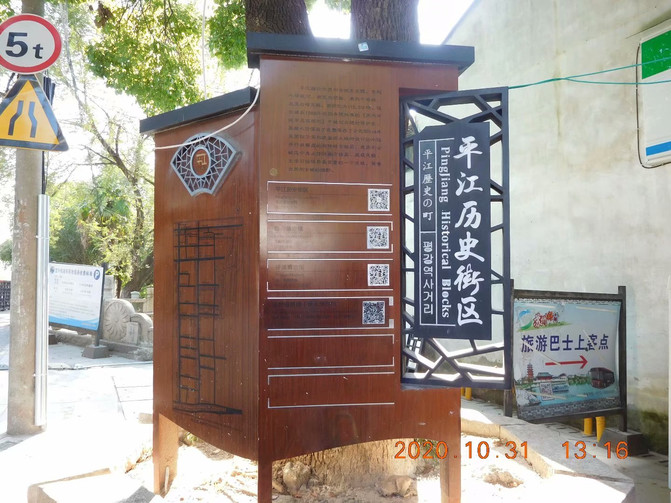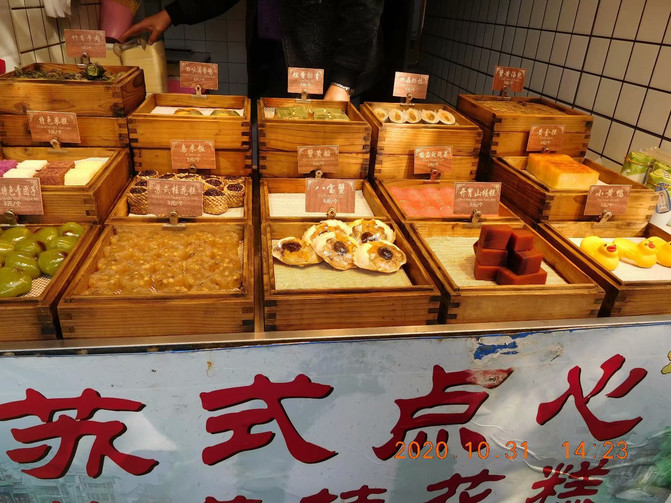[Gouqi Island Shanghai-Suzhou Tour] 9. Pingjiang Road along the river epitomizes the beauty of Suzhou since the Tang and Song Dynasties

[Gouqi Island Shanghai-Suzhou Tour] 9. Pingjiang Road along the river epitomizes the beauty of Suzhou since the Tang and Song Dynasties
On October 31, when we came out of Humble Administrator's Garden, the tour guide took us to Pingjiang Road and told us to take the straight road and not walk into the alleys inside. It would be easy to get lost. In addition, we had limited time, so we had to take the main road and miss the alleys. We missed many celebrity residences.
Pingjiang Road is an old historical street in Suzhou, a classic water alley, with a total length of 1606 meters. It is a small road along the river. It connects Humble Administrator's Garden in the north and looks out to the Twin Towers in the south. Its river is called Pingjiang River. Pingjiang Road Historical District is by far the most completely preserved area in the ancient city of Suzhou, and can be called the epitome of the ancient city. Compared with the "Pingjiang Map" of the Southern Song Dynasty and the "General Plan of Waterways in Suzhou Prefecture City" of the late Ming Dynasty, Pingjiang Road basically continues the city-square pattern since the Tang and Song Dynasties, with "waterways parallel and river streets adjacent." On one side of the street is the Pingjiang River, and on the other side there are many restaurants. It has a strong commercial flavor and remains vibrant to this day.
The narrow streets are a little crowded, mostly tourist groups.



Sai Jinhua, who sang in the Qinhuai River, lived here for half a year because Hong Jun married her.
Do you remember in the previous article in this series of travel notes,"Classical Garden Humble Administrator's Garden, Bright Moon, Qingfeng, and Me", it was introduced that Zhang Luqian, the owner of the "Thirty-Six Mandarin Duck Pavilion" in Humble Administrator's Garden, asked someone to buy stained glass from Europe? The person entrusted to him is Hong Jun (the plaque inscribed in the museum "Thirty-six Mandarin Duck Pavilion" is also his inscription). There are two famous people on Pingjiang Road. Hong Jun, who lives at No. 27 Xuanqiao Lane, Pingjiang Road. He was the top scorer of Tongzhi's seventh year high school. He was slowly promoted from the Hanlin Academy to the left assistant minister of the Ministry of War. He was naturally famous for his official position, but his later romantic marriage made him famous. On a sunny morning in 1886, he married Sai Jinhua, a "famous prostitute in the Qinhuai River" who was 28 years old, to the Hong family and became his third aunt.

These two pictures come from the Internet, and I would like to express my thanks.

A great talent and senior official actually fell in love with a beautiful woman in pink. It is full of romance in itself. It is said that Hong Jun saw Saijinhua singing on the Qinhuai River on his way back to his hometown for the funeral. This is a look at the history of "Pear Blossom Begonia". At that time, he asked Sai Jinhua to play and sing for him every day. Later, at the instigation of friends, this marriage was approved by the First Lady and Second Lady. So in the season of fragrant osmanthus the following year, beautiful woman Sai Jinhua walked into No. 27 Xuanqiao Lane. Lord Hong also built a house specially for Sai Jinhua, which is the "seventh entry" room in the Hong family compound. Amid the dense moisture of Jiangnan, Sai Jinhua stretches leisurely and moistened in the courtyard of No. 27. She often listens to pingtan and singing Kunqu Opera, as well as Beijing Opera in the courtyard after meals or in her spare time. In the eyes of her subordinates, she is a gentle and kind person. The big lady looked down on her a little for being a concubine, but overall, this marriage was still very exciting.
In the midsummer of 1890, Hong Jun returned from the four Western countries as an envoy of the Qing Dynasty government with Sai Jinhua. By this time, Sai Jinhua was already able to speak a good foreign language. She was making trouble in the social circle and naturally became China's first generation of "social flowers." They still returned to Suzhou, returned to Pingjiang Road, moved into No. 29 Xuanqiao Lane, and brought back a piano. However, just two months later, Hong Jun passed away at the age of 55. Leaving behind the young and beautiful Sai Jinhua, she left No. 29 Xuanqiao Lane with infinite emotion and went to Shanghai, where she began the life of a "famous prostitute" that truly belonged to her. Counting the time, Sai Jinhua has lived in the Hong Family Courtyard in Xuanqiao Lane next to Pingjiang Road for only half a year, and Hong Jun's time has only been seven years. However, Nos. 27 and 29 in Xuanqiao Lane have become a lasting story. Walking around here, I seem to sometimes feel that the elegant Sai Jinhua will walk out of that corner!
Pingjiang Road is a small road near the river, connecting Humble Administrator's Garden in the north and overlooking the Twin Towers in the south. It has a total length of 1606 meters. It is a classic water alley with a long history in Suzhou.



In addition to Pingjiang Road being famous for its history, its food is one of the outstanding features of Pingjiang Road. The old street here not only preserves ancient buildings, but also the food and restaurants in the old street are closely related to Suzhou's ancient food culture. You may not know that the food on this street is very unique.
Look at the street food along the old street from beginning to end. It is cooked by local indigenous residents and dressed in costumes with Jiangnan characteristics and sold along the street. There are osmanthus cakes, wine-brewed meatballs, fresh meat mooncakes, crabapple cakes, bamboo tube glutinous rice cakes, and special street snacks on Pingjiang Road such as big bowl tea allow you to experience the culture of Pingjiang Road while walking. I just bought a few freshly made osmanthus cakes (8 pieces for 15 yuan). They have original flavor, osmanthus flavor, bean paste flavor, and red dates flavor. They are soft, glutinous and sweet, and are not bad.

Don't underestimate those shops that stand on the street under blue bricks and white tiles. It is said that many friends who know how to eat come specially for it. It is said that there is a Zhuangyuan Street Dumpling House next to Pingjiang Inn. His family's Suwei ya slices fish heads are smooth and tender at the entrance and are extremely fragrant, which is unforgettable, but we don't have time to taste them.
There are also some large-scale restaurants that mainly deal in Suzhou cuisine, with more authentic old flavors. For example, squirrel mandarin fish, crab yellow tofu, sweet and sour pork ribs, sweet and sour fish, sauce hoofs, preserved egg and lean pork porridge, etc. are all must-order. Just seeing the name of this dish will make people salivate. All the delicacies here highlight the food culture of Pingjiang Road and tell ancient food stories.



A large number of old-fashioned houses are preserved around Pingjiang Road, and it is difficult to see high-rise steel bars from afar (the municipal government has imposed restrictions on the height of buildings in order to protect the ancient city). Most houses on the west of the river are built along the river. Elderly houses have white walls and blue tiles, wooden grids and flower windows, and the wood is mostly brown-red or brown-black, which is light and distinct. Most of the exterior walls are mottled, but they are like a painting peeled off. Many vines and vines grew up from the peeling off of the wall, swaying in the wind and making them look lively. The craftsmen in Jiangnan have exquisite minds and bring garden aesthetics to the extreme.



There is a lilac alley here. Many people mistakenly think it is the rainy alley in Mr. Dai's poem. In fact, it is not, but this beautiful coincidence still makes people full of reverie. If you don't know where Dingxiang Lane is, go directly to Maokong on Pingjiang Road. This long alley is next to Maokong. Seeing this deep alley, I remembered the poem by Mr. Dai Wangshu:
Holding an oil-paper umbrella, alone
Wandering in the long, long
The lonely rain alley,
hoping to encounter
A lilac
A girl with sorrow and resentment
……

This is an old street full of history but remains vibrant.
When I walked along Pingjiang Road for the first time, the scenery I saw satisfied some of my fantasies about Jiangnan. There were white walls and green tiles and small bridges and flowing water. The rowing boat slowly crossed the water. A few Kunqu opera songs floated out from time to time in the teahouse to give you the urge to go in and listen.
Here,
Old, desolate and mottled stone bridges and walls,
Silently recording thousands of ups and downs and sad stories...
In the Song and Yuan Dynasties, the white walls and black tiles, the bluestone roads, and the clear river water reflected the lush swaying willow trees, revealing the beauty of tranquility everywhere. Looking at the modern high-rise building across the water bank, she lowered her eyebrows and eyes more and more, like a watery Jiangnan woman, with a trace of grievance hanging on the corner of her mouth that she had not yet expressed.






Listen to the shouts of small stalls on the street and look at the green willow branches that occasionally stick out of the wall. The poetic and picturesque meaning of "small bridges, flowing water, and people" is fully displayed on Pingjiang Road.
The Internet celebrity shop "Cat Empty", the beautiful dried flower shop "No Flowers Missing", and the "First Meeting of Pingjiang" cultural and creative space. The low-key and fresh literary and artistic style is pleasing to the eye, creative and very elegant.




Walking through the numerous shops, people passing by with smiles on their faces.
The long stone road, the gurgling sound of running water, moss, flower windows, black tiles, wild cats, and the grandma at the intersection hummed a tune and woven a wreath. In this way, it collided with the autumn of Suzhou.
After my eyes and mind have been confused for a long time, memory loss is obvious. Pingjiang Road holds a trace of the past, and it works hard to guide people who look back.




The TV series "It's All Good" is filmed here, but I don't have time to see it.
Pingjiang Road in Suzhou is now famous nationwide, with an endless stream of tourists. The street has a serious commercial atmosphere. The street is full of smoke and smoke, and there are indistinguishable chicken feet one after another. Is this the style of Suzhou Old Street? Maybe all the old streets across the country have such commercial routines, and we are no longer surprised. Tourists want to be lively, so why does Xiao Er need to speak Suzhou dialect?



The next time I want to find an off-season to go to Suzhou, I will go for a walk in the alleys of Pingjiang Road alone and experience the true beauty of tranquility that is different from neon enchanting, and the true flavor of Suzhou-the kind that combines thousands of years of cultural heritage and the charm of Kunqu Opera's cadence singing.
(2569 2020/11/20)
Previous Article:Awesome! There is an 83-year-old blacksmith in Zhouzhuang, Suzhou. He has been forging iron for 70 years and can still swing a hammer
Next Article:Taste Tongli carefully-the golden Beilian Village
